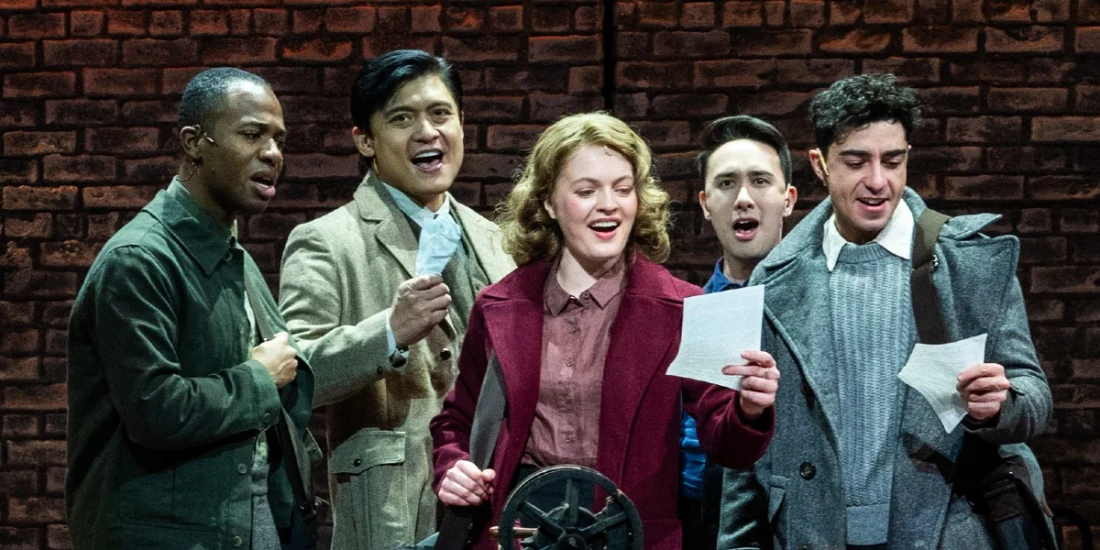'White Rose: The Musical' review — historical story of young activists remains relevant
Read our review of White Rose: The Musical off Broadway starring Jo Ellen Pellman, Mike Cefalo, and Paolo Montalban, at Theatre Row through March 31.
The history-based White Rose: The Musical has its heart in the right place. The show tells a relevant true story about German college activists confronting fascism in the 1940s, weaponizing their privilege for good.
But while Natalie Brice’s contemporary score pleases the ear with Brian Belding’s broad lyrics, the show's Theatre Row premiere, featuring a script by Belding and direction by Will Nunziata, doesn't quite capture the weightiness of the history playing out upon James Noone’s economical bricked scenic design, accompanied by Caitet Hevner’s seamless projection design.
With a suitcase and can-do disposition, Sophie Scholl (Jo Ellen Pellman) enters her Munich university like an aspiring star coming to the Big Apple, ready to confront a campus destabilizing under Nazism. Sophie, her brother Hans (Mike Cefalo), and their classmates assemble to form the White Rose resistance group to spread pamphlets denouncing the Nazis' anti-Semitism and war.
The Scholl siblings are the wobbly center of White Rose. Pellman's (The Prom on Netflix) performance ensures Sophie’s can-doism is never in doubt: She seldom shows that Sophie is burdened by pressure, though the script claims she's tempted to run from her responsibilities. As the musical MVP, Pellman’s stage sibling Cefalo wears a steely expression as the overprotective brother who broke from his Hilter Youth upbringing. He gives a take-no-prisoners performance, even as he delivers some syrupy lines.
To White Rose’s credit, the ensemble numbers are the score's standouts amid textbook ballads and duets — “Why Are You Here?”/“The Mess They Made” breathes fire a la “Red and Black” from Les Misérables — and the supporting players more potently posit the question: If you can’t change the world, how far can you change the people around you?
An amiable Kennedy Kanagawa plays a 23-year-old Christoph Probst, whose meditative song “Fatherhood” links action-taking to parenthood. Cole Thompson portrays 24-year-old Willi Graf as overwhelmed by the evils around him. Aaron Ramey (understudying for Paolo Montalban at my performance) injects paternal warmth as the 40something Professor Kurt Huber, pulling off a believable grappling between safety and speaking out. Laura Sky Herman sings her heart out as Lila Ramdorh, a hopeful survivor, and understudy Pasquale Crociata executes a grisly job as the Hitler-favored Hermann Giesler.
Compromising the White Rose's rebellion is the 23-year-old Frederick Fischer (Sam Gravitte), a Nazi officer and Sophie's old flame. His absurd self-assurance “I’m police, not Gestapo” is one of the few commentaries that lands. The musical gives him a provocative, muddied backstory, though his arc is ultimately an awkward sympathy tale.
In its current incarnation, surface-level sentimentality prevents White Rose from plunging more deeply into the complexity of its story and characters. The sacred act of tossing leaflets to the audience should hit as a cathartic feat, yet it feels decorative. If you’re a lucky audience member who catches a leaflet — inscribed with anti-war excerpts from the real White Rose — its call to action is urgent. These words are meant to be taken outside of the theatre, even after the action on the stage fades.
Photo credit: Cole Thompson, Paolo Montalban, Jo Ellen Pellman, Kennedy Kanagawa and Mike Cefalo in White Rose: The Musical. (Photo by Russ Rowland)
Originally published on
